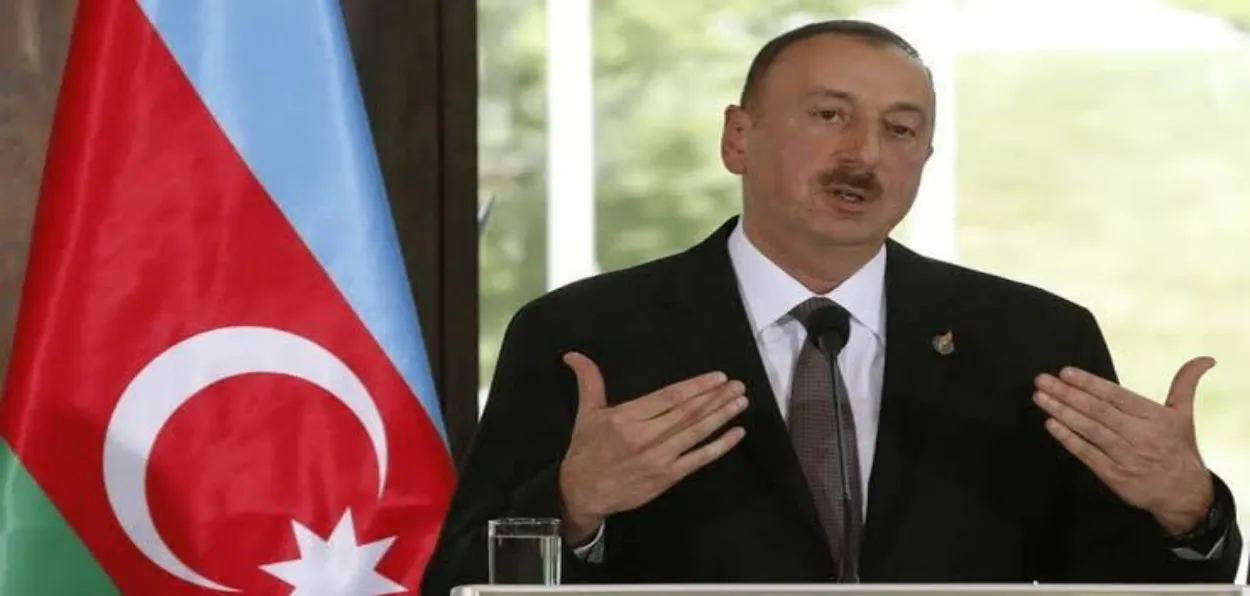
Azerbaijan claims India blocked its SCO membership over Pakistan ties.(photo - videograb)
What Is the SCO and Why It Matters
Azerbaijan Is Upset with India – The Shanghai Cooperation Organisation (SCO) is a powerful regional group that includes countries like China, Russia, India, and Pakistan. It focuses on security, trade, and cooperation across Asia. Being a full member of the SCO gives a country more influence in global decisions, better trade opportunities, and stronger diplomatic ties.
Azerbaijan, a country located between Eastern Europe and Western Asia, has been trying to become a full member of the SCO. It already holds the status of a “dialogue partner,” but wants to upgrade its position. However, recent reports say India blocked Azerbaijan’s bid for full membership during the SCO summit held in Tianjin, China.
The Allegation: India’s “Revenge” Over Pakistan Ties
Azerbaijan claims that India blocked its membership because of Baku’s close friendship with Pakistan. According to Azerbaijani media and officials, India is “seeking revenge” on global platforms due to Azerbaijan’s support for Pakistan during recent military tensions.
This tension reportedly grew after India launched “Operation Sindoor” in May 2025, a military response to a deadly terror attack in Pahalgam, Kashmir. The operation targeted terrorist groups in Pakistan and Pakistan-occupied Kashmir. Azerbaijan publicly supported Pakistan during this time, which may have upset India.
During the SCO summit, Azerbaijani President Ilham Aliyev met with Pakistani Prime Minister Shehbaz Sharif and congratulated Pakistan on what he called a “victory” over India. He also praised the “brotherhood” between Azerbaijan and Pakistan. These statements added fuel to the fire and may have influenced India’s decision to block Azerbaijan’s SCO membership.
Diplomacy or Dispute: What Experts Are Saying
Azerbaijan’s media has criticized India’s move, calling it a violation of “multilateral diplomacy” and the “Shanghai Spirit”, a principle that encourages cooperation and respect among SCO members. They argue that personal or bilateral disputes should not affect decisions made in international groups.
India has not officially responded to these allegations. However, experts believe that India’s decision may be based on strategic concerns. Azerbaijan’s strong ties with Pakistan and Turkey, two countries that often criticize India’s policies could be seen as a threat to India’s interests in the region.
Some analysts also point out that India has the right to protect its national interests within international organizations. Blocking a country’s membership is not unusual in global politics, especially when security and alliances are involved.
Azerbaijan Is Upset with India – What This Means for the Future
This incident could affect relations between India and Azerbaijan. It may also impact how other countries view India’s role in the SCO. If India is seen as using its influence to settle scores, it could face criticism from other members.
On the other hand, India may gain support from countries that share its concerns about terrorism and regional stability. The SCO is meant to promote peace and cooperation, but this situation shows how complex international politics can be.
For Azerbaijan, the road to full SCO membership may now be longer and more difficult. It will need to balance its ties with Pakistan while trying to improve relations with India and other SCO members.
Conclusion: This diplomatic clash between India and Azerbaijan is more than just a membership issue, it reflects deeper tensions in regional politics. As global alliances shift and new challenges arise, countries must find ways to work together without letting old rivalries get in the way. Whether this is a temporary setback or a long-term standoff, only time will tell.
Also read – Tianjin Takes the Spotlight: China’s Bold Choice for the 2025 SCO Summit
Bridges Over Borders: Modi and Xi Landmark Pact in Tianjin, Reignite India-China Cooperation
Stay informed with the latest news and updates – only on Rapido Updates.